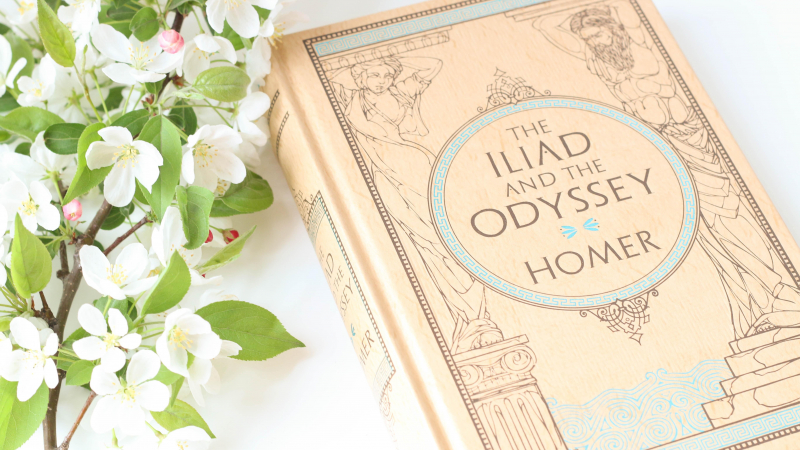Three Ways that Classical and Christian Literature is a Ballast During Hard Times

A few years ago, I was part of a sailing race. I was on a schooner in the Chesapeake Bay that was racing another identical ship. I was not part of the crew—just an observer—but it was very fun. It is fascinating to see how a seasoned captain uses the wind to move the boat. The experience made me muse on what it would be like to in a boat on the water during a strong storm. I think it would be terrifying. It was for the disciples until Jesus calmed the seas. From time to time, all of us face trials and troubles. These trials reveal our faith and character or they show that we are lacking faith or that our character is immature. How can we build up strength to face trials? One of the best ways is to consider the stories of the past. We can do this by learning about the stories of how our families faced and overcame trials in the past, but we should also learn from the Great Books, particularly the Greatest Book (the Bible), how others went through trials and how they were able to do so with faith. Here are three ways that classical and Christian literature can be a ballast for you during times of trouble and trial:
- By Showing Us that Others Have Gone Through Hard Times Before Us
When trials come upon us, it is easy to become really subjective and to focus on our feelings. Now, feelings—as my daughters remind me—are not always bad, but they are a really bad guide during troubled times. As Plato reminds us in the Phaedrus, reasons should be guiding the chariot or our lives. As believers, of course, we know that reason, to be a good guide, must rest on the foundation of faith in a God who has revealed Himself and who gives us, through that revelation, a bedrock on which reason can know foundational truth.
Even if we have faith and keep our wits about us, it is comforting to know that people have faced and gone through challenges larger and more dangerous than the ones that are currently facing us. It is comforting, in a way, to read about Churchill during the first days of the bombing. Facing annihilation, he did not give way to fear. I love the Ken Burns documentary on the Civil War where he has actors read the letter and journals of brave soldiers and civilians during the war. Many of these people were ardent believers and watching how they wrestle with and trust God as they try to make sense of their own suffering or the horrors around them can help to both settle your feelings and give you hope by knowing that your experiences are not as unusual as they might feel.
Finally, the Psalms should always be close at hand during times of trouble. David, a man after God’s heart, was faced with so many trials and troubles. He was hunted down by King Saul. He was betrayed by Absalom. He brought catastrophe on his own head by sinning with Bathsheba. In the Psalms, he pours his heart out to God. The other Psalmists do as well. I take great comfort in the Psalms because they reveal that the trials I face are not there because God hates me. He loved David and David still had great troubles. During times of trouble, the darker the Psalm the more it can help you. On the worst days, I often read Psalm 88. In it, there are no notes of light and no strong affirmations of hope. Depressing? No, it just means that there are going to be days when the sun doesn’t come up. These days are not unprecedented and others have faced them before.
- By Demonstrating the Despair of Unbelief
The great books also show us the despair of unbelief during a time of trouble. Trials reveal character, and character is built on hope and truth. Unbelief is rocked by trials because it has no hope. My favorite example of this is in the epics of Homer. These epics, the Odyssey and the Iliad, were the highest writings of Greek culture. In them, the poet, moved by the gods, revealed to the listeners the heroic virtues of Greek culture—virtues of strength and cunning. At the center of these two stories are two men, Achilles and Odysseus. The Odyssey ends up being a heart-warming story of homecoming compared to the darker Iliad even though Odysseus’s arrival means death for the wicked suitors. The story of Achilles, however, demonstrates the hopelessness of unbelief. He flies into a rage when Agamemnon steals his slave-bride and the sulking hero abandons the fight. He then roars back into the action when Patroclus is killed. After taking revenge on Hector and trying to defile Hector’s body, he ends up in tears because, as he speaks with Priam, he realizes that his fate will be just like the fallen Hector’s one day. This hopelessness comes into focus during Odysseus’s visit to Hades in the Odyssey. There he meets the shade of Achilles and lets him know that his glory through the story of the battle for Troy is still resounding in the world of the living. Shockingly, Achilles’s shade announces that he would rather be a slave in the land of the living than king in the dim world of the dead. Unbelief has no hope.
During John 6, Jesus thins out the numbers of His followers by requiring them to “eat my flesh” and “drink my blood.” Many slink away. Christ then turns to the twelve and asks them if they were going to leave as well. Peter answer, “Where else would we go?” Reading the Homeric epics helps us to recognize the hopelessness of life outside of Christ and can help us be content during times of trouble because we can have no other hope but Him.
- By Reminding Us of the God who Walks with Us Through Hard Times
Christian writers among the Great Books remind us of this. One of the best examples is in C. S. Lewis’s The Horse and His Boy. When Shasta and Aravis (and Brie) are traveling, they encounter lions chasing them and sometimes even harming them. Finally, Shasta meets the Lion, Aslan, who fills the role of Christ in the Narnia Chronicles. From Aslan, he learns that there was only one lion chasing them and that it was in fact Aslan. Aslan was with them even when it felt like he was against them.
We can also see this in Bunyan’s classic, Pilgrim’s Progress, in it the Lord guides Christian along the path to the Celestial City. The path is not easy. People abandon and betray him along the way. God sends friends to encourage and lead him and God is always watching over him until finally he reaches his destination.
Troubles will come. We serve an interesting God who has placed us in His interesting story. In it, horrible things happen—and will happen to us—reading the right book, the Bible and the Great Books, prepares us to face these challenges with courage, faith, and wisdom knowing that God has provided for His people in the past—and that He will provide for us.







